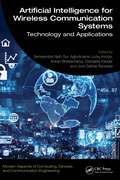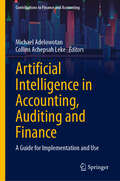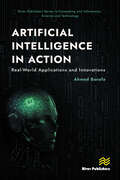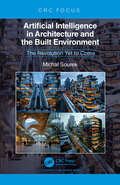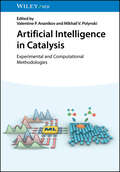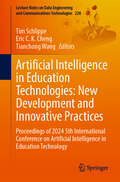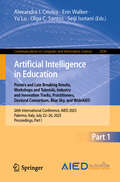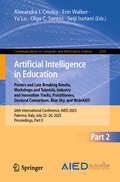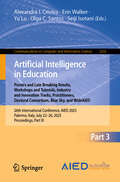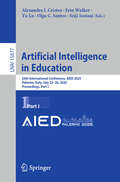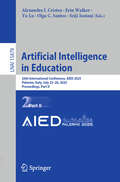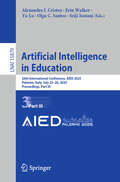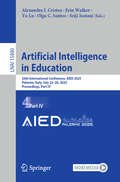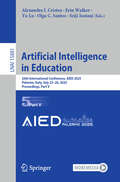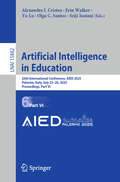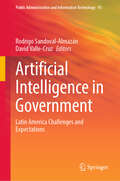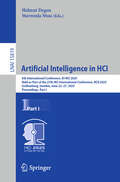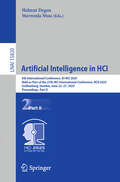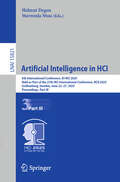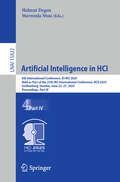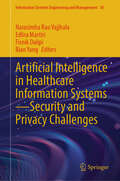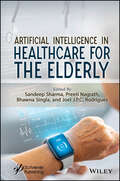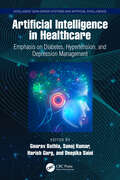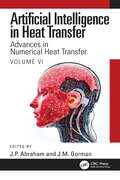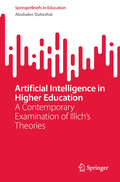- Table View
- List View
Artificial Intelligence for Wireless Communication Systems: Technology and Applications (Modern Aspects of Computing, Devices, and Communication Engineering)
by Debdatta Kandar Samarendra Nath Sur Agbotiname Lucky Imoize Jyoti Sekhar Banerjee Ankan BhattacharyaThe text provides a comprehensive study of the application of advanced artificial intelligence (AI) in next-generation wireless communications with a focus on theory, standardization, and core development. It further highlights AI-enabled intelligent architecture for sixth-generation (6G) networks to realize smart resource management, automatic network adjustment, and intelligent service layers. The book covers artificially assisted non-orthogonal multiple access schemes for 6G communication.This book: Discusses the use of AI in various aspects of wireless communications, including channel modeling, signal detection, channel coding design, and resource management Explores technical challenges in the ubiquitous fifth-generation (5G) wireless networks and the prospects of introducing artificial intelligence-based techniques in the envisioned 6G wireless networks Presents potential issues in AI-enabled approaches in wireless communications Covers AI-enabled energy efficiency optimization and cross-layer optimization in the next-generation wireless networks Explains artificially empowered security and privacy schemes in next-generation wireless networks and next-generation mobile management It is primarily written for senior undergraduates, graduate students, and academic researchers in the fields of electrical engineering, electronics and communication engineering, and computer engineering.
Artificial Intelligence in Accounting, Auditing and Finance: A Guide for Implementation and Use (Contributions to Finance and Accounting)
by Collins Achepsah Leke Michael AdelowotanThis book focuses on the use of Artificial Intelligence (AI) for accounting, auditing, and finance. It explores how AI can be leveraged to perform various tasks within these fields and offers real life examples to illustrate its features and facilitate implementation. The book further examines how different AI technologies, such as Machine Learning, Deep Learning, Natural Language Processing, and others, can be used to improve processes and functions in accounting and financial reporting. Furthermore, the authors explain the different subsets of Artificial Intelligence and how they can be used for practical purposes. The book provides a basic guide of these emerging technologies to help practitioners in the field to better understand how they can be implemented in their companies.
Artificial Intelligence in Action: Real-World Applications and Innovations (River Publishers Series in Computing and Information Science and Technology)
by Ahmed BanafaThis comprehensive book dives deep into the current landscape of AI, exploring its fundamental principles, development challenges, potential risks, and the cutting-edge breakthroughs that are propelling it forward. Artificial intelligence (AI) is rapidly transforming industries and societies worldwide through groundbreaking innovations and real-world applications. Starting with the core concepts, the book examines the various types of AI systems, generative AI models, and the complexities of machine learning. It delves into the programming languages driving AI development, data pipelines, model creation and deployment processes, while shedding light on issues like AI hallucinations and the intricate path of machine unlearning.The book then showcases the remarkable real-world applications of AI across diverse domains. From preventing job displacement and promoting environmental sustainability, to enhancing disaster response, drone technology, and even nuclear energy innovation, it highlights how AI is tackling complex challenges and driving positive change.The book also explores the double-edged nature of AI, recognizing its tremendous potential while cautioning about the risks of misuse, unintended consequences, and the urgent need for responsible development practices. It examines the intersection of AI and fields like operating system design, warfare, and semiconductor technology, underscoring the wide-ranging implications of this transformative force.As the quest for artificial general intelligence (AGI) and superintelligent AI systems intensifies, the book delves into cutting-edge research, emerging trends, and the pursuit of multimodal, explainable, and causally aware AI systems. It explores the symbiotic relationship between AI and human creativity, the rise of user-friendly "casual AI," and the potential of AI to tackle open-ended tasks.This is an essential guide for understanding the profound impact of AI on our world today and its potential to shape our future. From the frontiers of innovation to the challenges of responsible development, this book offers a comprehensive and insightful exploration of the remarkable real-world applications and innovations driving the AI revolution.
Artificial Intelligence in Architecture and the Built Environment: The Revolution Yet to Come
by Michal SourekImagine if every architect had an apprentice who could consistently observe and understand their intentions, take over routine tasks and monitor technical, environmental, and economic constraints. This apprentice would continually improve, freeing the architect to concentrate on truly creative work.This book outlines a plan to turn this vision into reality. It evaluates the development of artificial intelligence from its inception to the present, focusing on the last two decades of applying AI in architectural design and planning; the current state of architectural practice is also examined. Integrating architecture, computer science, AI, robotics, economics, law, neurobiology, and philosophy, the vision is built on three key premises: (i) authentic, poetic creativity that transcends parameterization and algorithmizing, (ii) innovative learning strategies and training approaches not yet applied concerning architectural design, and (iii) the convergence of architecture’s inherent spatiality with virtual reality technology and new theories of human thinking and intelligence, poised for implementation in machine learning.
Artificial Intelligence in Catalysis: Experimental and Computational Methodologies
by Valentine P. Ananikov Mikhail V. PolynskiEnables researchers and professionals to leverage machine learning tools to optimize catalyst design and chemical processes Artificial Intelligence in Catalysis delivers a state-of-the-art overview of artificial intelligence methodologies applied in catalysis. Divided into three parts, it covers the latest advancements and trends for catalyst discovery and characterization, reaction predictions, and process optimization using machine learning, quantum chemistry, and cheminformatics. Written by an international team of experts in the field, with each chapter combining experimental and computational knowledge, Artificial Intelligence in Catalysis includes information on: Artificial intelligence techniques for chemical reaction monitoring and structural analysisApplication of artificial neural networks in the analysis of electron microscopy dataConstruction of training datasets for chemical reactivity prediction through computational meansCatalyst optimization and discovery using machine learning modelsPredicting selectivity in asymmetric catalysis with machine learning Artificial Intelligence in Catalysis is a practical guide for researchers in academia and industry interested in developing new catalysts, improving organic synthesis, and minimizing waste and energy use.
Artificial Intelligence in Education Technologies: Proceedings of 2024 5th International Conference on Artificial Intelligence in Education Technology (Lecture Notes on Data Engineering and Communications Technologies #228)
by Eric C. K. Cheng Tianchong Wang Tim SchlippeThis book is a collection of selected research papers presented at the 2024 5th International Conference on Artificial Intelligence in Education Technology (AIET 2024), held in Barcelona, Spain, on July 29 - 31, 2024. AIET establishes a platform for AI in education researchers to present research, exchange innovative ideas, propose new models, as well as demonstrate advanced methodologies and novel systems. It is a timely and up-to-date publication responsive to the rapid development of AI technologies, practices and their increasingly complex interplay with the education domain. It promotes the cross-fertilisation of knowledge and ideas from researchers in various fields to construct the interdisciplinary research area of AI in Education. These subject areas include computer science, cognitive science, education, learning sciences, educational technology, psychology, philosophy, sociology, anthropology and linguistics. The feature of this book will contribute from diverse perspectives to form a dynamic picture of AI in Education. It also includes various domain-specific areas for which AI and other education technology systems have been designed or used in an attempt to address challenges and transform educational practice. Education stands as a cornerstone for societal progress, and ensuring universal access to quality education is integral to achieving Goal 4 of the United Nations' Sustainable Development Goals (SDGs). The goal is to ensure inclusive and equitable quality education for all by 2030. This involves not only expanding access to education but also improving the quality of education to promote lifelong learning opportunities. AI has the potential to significantly contribute to the achievement of Goal 4. It is committed to exploring how AI may play a role in bringing more innovative practices, transforming education, and triggering an exponential leap towards the achievement of the Education 2030 Agenda. Providing broad coverage of recent technology-driven advances and addressing a number of learning-centric themes, the book is an informative and useful resource for researchers, practitioners, education leaders and policy-makers who are involved or interested in AI and education.
Artificial Intelligence in Education. Posters and Late Breaking Results, Workshops and Tutorials, Industry and Innovation Tracks, Practitioners, Doctoral Consortium, Blue Sky, and WideAIED: 26th International Conference, AIED 2025, Palermo, Italy, July 22–26, 2025, Proceedings, Part I (Communications in Computer and Information Science #2590)
by Olga C. Santos Alexandra I. Cristea Seiji Isotani Yu Lu Erin WalkerThis three-volume set CCIS 2590-2592 constitutes poster papers and late breaking results, workshops and tutorials, practitioners, industry and policy track, doctoral consortium, blue sky and wideAIED papers presented at the 26th International Conference on Artificial Intelligence in Education, AIED 2025, held in Palermo, Italy, during July 22–26, 2025. The 72 full papers and 73 short papers (72 of them presented as posters) presented in this book were carefully reviewed and selected from 296 submissions. They are organized in topical sections as follows: Part I: BlueSky; Practitioners, Industry and Policy; WideAIED; Doctoral Consortium. Part II: Late Breaking Results; Part III: Late Breaking Results; Workshops and Tutorials.
Artificial Intelligence in Education. Posters and Late Breaking Results, Workshops and Tutorials, Industry and Innovation Tracks, Practitioners, Doctoral Consortium, Blue Sky, and WideAIED: 26th International Conference, AIED 2025, Palermo, Italy, July 22–26, 2025, Proceedings, Part II (Communications in Computer and Information Science #2591)
by Olga C. Santos Alexandra I. Cristea Seiji Isotani Yu Lu Erin WalkerThis three-volume set CCIS 2590-2592 constitutes poster papers and late breaking results, workshops and tutorials, practitioners, industry and policy track, doctoral consortium, blue sky and wideAIED papers presented at the 26th International Conference on Artificial Intelligence in Education, AIED 2025, held in Palermo, Italy, during July 22–26, 2025. The 72 full papers and 73 short papers (72 of them presented as posters) presented in this book were carefully reviewed and selected from 296 submissions. They are organized in topical sections as follows: Part I: BlueSky; Practitioners, Industry and Policy; WideAIED; Doctoral Consortium. Part II: Late Breaking Results; Part III: Late Breaking Results; Workshops and Tutorials.
Artificial Intelligence in Education. Posters and Late Breaking Results, Workshops and Tutorials, Industry and Innovation Tracks, Practitioners, Doctoral Consortium, Blue Sky, and WideAIED: 26th International Conference, AIED 2025, Palermo, Italy, July 22–26, 2025, Proceedings, Part III (Communications in Computer and Information Science #2592)
by Olga C. Santos Alexandra I. Cristea Seiji Isotani Yu Lu Erin WalkerThis three-volume set CCIS 2590-2592 constitutes poster papers and late breaking results, workshops and tutorials, practitioners, industry and policy track, doctoral consortium, blue sky and wideAIED papers presented at the 26th International Conference on Artificial Intelligence in Education, AIED 2025, held in Palermo, Italy, during July 22–26, 2025. The 72 full papers and 73 short papers (72 of them presented as posters) presented in this book were carefully reviewed and selected from 296 submissions. They are organized in topical sections as follows: Part I: BlueSky; Practitioners, Industry and Policy; WideAIED; Doctoral Consortium. Part II: Late Breaking Results; Part III: Late Breaking Results; Workshops and Tutorials.
Artificial Intelligence in Education: 26th International Conference, AIED 2025, Palermo, Italy, July 22–26, 2025, Proceedings, Part I (Lecture Notes in Computer Science #15877)
by Olga C. Santos Alexandra I. Cristea Seiji Isotani Yu Lu Erin WalkerThis six-volume set LNAI 15877-15882 constitutes the refereed proceedings of the 26th International Conference on Artificial Intelligence in Education, AIED 2025, held in Palermo, Italy, during July 22–26, 2025. The 130 full papers and 129 short papers presented in this book were carefully reviewed and selected from 711 submissions. The conference program comprises seven thematic tracks:Track 1: AIED Architectures and Tools Track 2: Machine Learning and Generative AI: Emphasising datadrivenTrack 3: Learning, Teaching, and Pedagogy Track 4: Human-Centred Design and Design-Based Research Track 5: Teaching AI Track 6: Ethics, Equity, and AIED in Society Track 7: Theoretical Aspects of AIED and AI-Based Modelling forEducation
Artificial Intelligence in Education: 26th International Conference, AIED 2025, Palermo, Italy, July 22–26, 2025, Proceedings, Part II (Lecture Notes in Computer Science #15878)
by Olga C. Santos Alexandra I. Cristea Seiji Isotani Yu Lu Erin WalkerThis six-volume set LNAI 15877-15882 constitutes the refereed proceedings of the 26th International Conference on Artificial Intelligence in Education, AIED 2025, held in Palermo, Italy, during July 22–26, 2025. The 130 full papers and 129 short papers presented in this book were carefully reviewed and selected from 711 submissions. The conference program comprises seven thematic tracks:Track 1: AIED Architectures and Tools Track 2: Machine Learning and Generative AI: Emphasising datadrivenTrack 3: Learning, Teaching, and Pedagogy Track 4: Human-Centred Design and Design-Based Research Track 5: Teaching AI Track 6: Ethics, Equity, and AIED in Society Track 7: Theoretical Aspects of AIED and AI-Based Modelling forEducation
Artificial Intelligence in Education: 26th International Conference, AIED 2025, Palermo, Italy, July 22–26, 2025, Proceedings, Part III (Lecture Notes in Computer Science #15879)
by Olga C. Santos Alexandra I. Cristea Seiji Isotani Yu Lu Erin WalkerThis six-volume set LNAI 15877-15882 constitutes the refereed proceedings of the 26th International Conference on Artificial Intelligence in Education, AIED 2025, held in Palermo, Italy, during July 22–26, 2025. The 130 full papers and 129 short papers presented in this book were carefully reviewed and selected from 711 submissions. The conference program comprises seven thematic tracks:Track 1: AIED Architectures and Tools Track 2: Machine Learning and Generative AI: Emphasising datadrivenTrack 3: Learning, Teaching, and Pedagogy Track 4: Human-Centred Design and Design-Based Research Track 5: Teaching AI Track 6: Ethics, Equity, and AIED in Society Track 7: Theoretical Aspects of AIED and AI-Based Modelling forEducation
Artificial Intelligence in Education: 26th International Conference, AIED 2025, Palermo, Italy, July 22–26, 2025, Proceedings, Part IV (Lecture Notes in Computer Science #15880)
by Olga C. Santos Alexandra I. Cristea Seiji Isotani Yu Lu Erin WalkerThis six-volume set LNAI 15877-15882 constitutes the refereed proceedings of the 26th International Conference on Artificial Intelligence in Education, AIED 2025, held in Palermo, Italy, during July 22–26, 2025. The 130 full papers and 129 short papers presented in this book were carefully reviewed and selected from 711 submissions. The conference program comprises seven thematic tracks:Track 1: AIED Architectures and Tools Track 2: Machine Learning and Generative AI: Emphasising datadrivenTrack 3: Learning, Teaching, and Pedagogy Track 4: Human-Centred Design and Design-Based Research Track 5: Teaching AI Track 6: Ethics, Equity, and AIED in Society Track 7: Theoretical Aspects of AIED and AI-Based Modelling forEducation
Artificial Intelligence in Education: 26th International Conference, AIED 2025, Palermo, Italy, July 22–26, 2025, Proceedings, Part V (Lecture Notes in Computer Science #15881)
by Olga C. Santos Alexandra I. Cristea Seiji Isotani Yu Lu Erin WalkerThis six-volume set LNAI 15877-15882 constitutes the refereed proceedings of the 26th International Conference on Artificial Intelligence in Education, AIED 2025, held in Palermo, Italy, during July 22–26, 2025. The 130 full papers and 129 short papers presented in this book were carefully reviewed and selected from 711 submissions. The conference program comprises seven thematic tracks:Track 1: AIED Architectures and Tools Track 2: Machine Learning and Generative AI: Emphasising datadrivenTrack 3: Learning, Teaching, and Pedagogy Track 4: Human-Centred Design and Design-Based Research Track 5: Teaching AI Track 6: Ethics, Equity, and AIED in Society Track 7: Theoretical Aspects of AIED and AI-Based Modelling forEducation
Artificial Intelligence in Education: 26th International Conference, AIED 2025, Palermo, Italy, July 22–26, 2025, Proceedings, Part VI (Lecture Notes in Computer Science #15882)
by Olga C. Santos Alexandra I. Cristea Seiji Isotani Yu Lu Erin WalkerThis six-volume set LNAI 15877-15882 constitutes the refereed proceedings of the 26th International Conference on Artificial Intelligence in Education, AIED 2025, held in Palermo, Italy, during July 22–26, 2025. The 130 full papers and 129 short papers presented in this book were carefully reviewed and selected from 711 submissions. The conference program comprises seven thematic tracks:Track 1: AIED Architectures and Tools Track 2: Machine Learning and Generative AI: Emphasising datadrivenTrack 3: Learning, Teaching, and Pedagogy Track 4: Human-Centred Design and Design-Based Research Track 5: Teaching AI Track 6: Ethics, Equity, and AIED in Society Track 7: Theoretical Aspects of AIED and AI-Based Modelling forEducation
Artificial Intelligence in Government: Latin America Challenges and Expectations (Public Administration and Information Technology #41)
by Rodrigo Sandoval-Almazán David Valle-Cruz This edited volume discusses the challenges of digital transformation in Latin America, specifically regarding the use of AI for government management in the public sector. This book brings together leading scholars and practitioners from the region to address the legal and regulatory frameworks needed to introduce AI into government processes, as well as the infrastructure requirements for successful implementation. It explores potential resistance from public officials towards technology adoption and ways to overcome it. Moreover, the book considers the digital divide that exists within Latin American societies, which may hinder access to AI tools for some citizens. It also discusses ethical considerations related to AI use in government processes, such as privacy concerns and algorithmic bias. Providing a comprehensive understanding of the challenges and opportunities that AI presents for Latin American governments, this volume will be of use to students and scholars interested in governance, public management, AI, and Latin American studies.
Artificial Intelligence in HCI: 6th International Conference, AI-HCI 2025, Held as Part of the 27th HCI International Conference, HCII 2025, Gothenburg, Sweden, June 22–27, 2025, Proceedings, Part I (Lecture Notes in Computer Science #15819)
by Helmut Degen Stavroula NtoaThe four-volume set LNAI 15819–15822 constitutes the thoroughly refereed proceedings of the 6th International Conference on Artificial Intelligence in HCI, AI-HCI 2025, held as part of the 27th International Conference, HCI International 2025, which took place in Gothenburg, Sweden, June 22-17, 2025. The total of 1430 papers and 355 posters included in the HCII 2025 proceedings was carefully reviewed and selected from 7972 submissions. The papers have been organized in topical sections as follows: Part I: Trust and Explainability in Human-AI Interaction; User Perceptions, Acceptance, and Engagement with AI; UX and Socio-Technical Considerations in AI Part II: Bias Mitigation and Ethics in AI Systems; Human-AI Collaboration and Teaming; Chatbots and AI-Driven Conversational Agents; AI in Language Processing and Communication. Part III: Generative AI in HCI; Human-LLM Interactions and UX Considerations; Everyday AI: Enhancing Culture, Well-Being, and Urban Living. Part IV: AI-Driven Creativity: Applications and Challenges; AI in Industry, Automation, and Robotics; Human-Centered AI and Machine Learning Technologies.
Artificial Intelligence in HCI: 6th International Conference, AI-HCI 2025, Held as Part of the 27th HCI International Conference, HCII 2025, Gothenburg, Sweden, June 22–27, 2025, Proceedings, Part II (Lecture Notes in Computer Science #15820)
by Helmut Degen Stavroula NtoaThe four-volume set LNAI 15819–15822 constitutes the thoroughly refereed proceedings of the 6th International Conference on Artificial Intelligence in HCI, AI-HCI 2025, held as part of the 27th International Conference, HCI International 2025, which took place in Gothenburg, Sweden, June 22-17, 2025. The total of 1430 papers and 355 posters included in the HCII 2025 proceedings was carefully reviewed and selected from 7972 submissions. The papers have been organized in topical sections as follows: Part I: Trust and Explainability in Human-AI Interaction; User Perceptions, Acceptance, and Engagement with AI; UX and Socio-Technical Considerations in AI Part II: Bias Mitigation and Ethics in AI Systems; Human-AI Collaboration and Teaming; Chatbots and AI-Driven Conversational Agents; AI in Language Processing and Communication. Part III: Generative AI in HCI; Human-LLM Interactions and UX Considerations; Everyday AI: Enhancing Culture, Well-Being, and Urban Living. Part IV: AI-Driven Creativity: Applications and Challenges; AI in Industry, Automation, and Robotics; Human-Centered AI and Machine Learning Technologies.
Artificial Intelligence in HCI: 6th International Conference, AI-HCI 2025, Held as Part of the 27th HCI International Conference, HCII 2025, Gothenburg, Sweden, June 22–27, 2025, Proceedings, Part III (Lecture Notes in Computer Science #15821)
by Helmut Degen Stavroula NtoaThe four-volume set LNAI 15819–15822 constitutes the thoroughly refereed proceedings of the 6th International Conference on Artificial Intelligence in HCI, AI-HCI 2025, held as part of the 27th International Conference, HCI International 2025, which took place in Gothenburg, Sweden, June 22-17, 2025. The total of 1430 papers and 355 posters included in the HCII 2025 proceedings was carefully reviewed and selected from 7972 submissions. The papers have been organized in topical sections as follows: Part I: Trust and Explainability in Human-AI Interaction; User Perceptions, Acceptance, and Engagement with AI; UX and Socio-Technical Considerations in AI Part II: Bias Mitigation and Ethics in AI Systems; Human-AI Collaboration and Teaming; Chatbots and AI-Driven Conversational Agents; AI in Language Processing and Communication. Part III: Generative AI in HCI; Human-LLM Interactions and UX Considerations; Everyday AI: Enhancing Culture, Well-Being, and Urban Living. Part IV: AI-Driven Creativity: Applications and Challenges; AI in Industry, Automation, and Robotics; Human-Centered AI and Machine Learning Technologies.
Artificial Intelligence in HCI: 6th International Conference, AI-HCI 2025, Held as Part of the 27th HCI International Conference, HCII 2025, Gothenburg, Sweden, June 22–27, 2025, Proceedings, Part IV (Lecture Notes in Computer Science #15822)
by Helmut Degen Stavroula NtoaThe four-volume set LNAI 15819–15822 constitutes the thoroughly refereed proceedings of the 6th International Conference on Artificial Intelligence in HCI, AI-HCI 2025, held as part of the 27th International Conference, HCI International 2025, which took place in Gothenburg, Sweden, June 22-17, 2025. The total of 1430 papers and 355 posters included in the HCII 2025 proceedings was carefully reviewed and selected from 7972 submissions. The papers have been organized in topical sections as follows: Part I: Trust and Explainability in Human-AI Interaction; User Perceptions, Acceptance, and Engagement with AI; UX and Socio-Technical Considerations in AI Part II: Bias Mitigation and Ethics in AI Systems; Human-AI Collaboration and Teaming; Chatbots and AI-Driven Conversational Agents; AI in Language Processing and Communication. Part III: Generative AI in HCI; Human-LLM Interactions and UX Considerations; Everyday AI: Enhancing Culture, Well-Being, and Urban Living. Part IV: AI-Driven Creativity: Applications and Challenges; AI in Industry, Automation, and Robotics; Human-Centered AI and Machine Learning Technologies.
Artificial Intelligence in Healthcare Information Systems—Security and Privacy Challenges (Information Systems Engineering and Management #34)
by Narasimha Rao Vajjhala Edlira Martiri Fisnik Dalipi Bian Yang“Artificial Intelligence (AI) in Healthcare Information Systems: Security and Privacy Challenges” offers a deep dive into the integration of AI in healthcare, with a primary focus on addressing the significant security and privacy concerns that arise in this domain. The chapters in this book highlight the transformative potential of AI in diagnosing and predicting diseases, as well as its impact on fields like fetal medicine, but places special emphasis on the need for robust encryption, data protection techniques, and ethical considerations to safeguard sensitive healthcare data. The book also explores global case studies, from India to Kazakhstan, outlining the challenges and prospects of AI adoption in diverse healthcare settings. Readers will gain insights into AI's role in improving patient outcomes while navigating the complexities of data privacy and security. The book is a valuable resource for healthcare professionals, technologists, and policymakers who are focused on implementing AI-driven solutions securely and ethically in healthcare systems.
Artificial Intelligence in Healthcare for the Elderly
by Joel J. P. C. Rodrigues Sandeep Sharma Bhawna Singla Preeti NagrathArtificial Intelligence in Healthcare for the Elderly provides valuable insights into how artificial intelligence can transform healthcare through personalized monitoring, ethical considerations, and real-world applications. Artificial intelligence has the potential to revolutionize healthcare for the elderly by providing efficient and personalized monitoring and care. Though this technology has the potential to revolutionize care, there is currently little information on the potential of this technology in elderly healthcare. Artificial Intelligence in Healthcare for the Elderly explores AI algorithms that can transform health monitoring for older adults by analyzing data from wearable devices, electronic health records, and other sources that provide real-time data analysis, detect early warning signs of diseases, and offer personalized treatment. This book addresses the critical ethical, societal, and practical aspects of elderly care that are often overlooked with insights from various disciplines, including healthcare, technology, ethics, and sociology, to offer a holistic perspective on AI’s impact on aging. Artificial Intelligence in Healthcare for the Elderly offers an all-encompassing perspective on AI technologies employed in elderly healthcare by examining the specific types of technology used and delineating its role in elderly healthcare, drawing insights from existing research and case studies.
Artificial Intelligence in Healthcare: Emphasis on Diabetes, Hypertension, and Depression Management (Intelligent Data-Driven Systems and Artificial Intelligence)
by Harish Garg Deepika Saini Gourav Bathla Sanoj KumarThis book presents state-of-the-art research works for a better understanding of the advantages and limitations of AI techniques in the field of healthcare. It will further discuss artificial intelligence applications in depression, hypertension and diabetes management. The text also presents an artificial intelligence chatbot for depression, diabetes, and hypertension self-help.This book: Provides a structured overview of recent developments of artificial intelligence applications in the healthcare sector. Presents an in-depth understanding of how artificial intelligence techniques can be applied to diabetes management. Showcases supervised learning techniques based on datasets for depression management. Discusses artificial intelligence chatbot for diabetes, depression, and hypertension self-care. Highlights the importance of artificial intelligence in managing and predicting diabetes, hypertension, and depression. The text is primarily written for senior undergraduate, graduate students, and academic researchers in diverse fields including electrical engineering, electronics and communications engineering, computer science and engineering, and biomedical engineering.
Artificial Intelligence in Heat Transfer: Advances in Numerical Heat Transfer Volume VI
by J. M. Gorman J. P. AbrahamArtificial Intelligence in Heat Transfer shows how artificial intelligence (AI) tools and techniques, such as artificial neural networks, machine learning algorithms, genetic algorithms, etc., provide practical benefits specific to thermal sciences. It presents case studies involving heat and mass transfer, multi-objective optimization, conjugate heat transfer, nanofluids, thermal radiation, heat transfer through porous media (metal foam), and more.Drawing on the collective expertise of leading researchers and experts in multiple fields, the book provides an in-depth understanding of the possibilities that emerge when these tools are applied to problems related to thermal sciences. AI is an ever-evolving discipline that has created new and groundbreaking opportunities to advance the mechanical engineering field, particularly in the area of numerical heat transfer. This volume, Advances in Numerical Heat Transfer, explores various ways AI is used in heat transfer to solve engineering problems.This book will serve as an important resource for upper-level undergraduate students, researchers, engineers, and professionals, equipping them with the knowledge and inspiration to push the boundaries of the thermal sciences through AI-driven tools and techniques.
Artificial Intelligence in Higher Education: A Contemporary Examination of Illich's Theories (SpringerBriefs in Education)
by Abubaker QutieshatThis book is multi-dimensional exploration of Ivan Illich's critique of institutionalized education. It dissects, analyzes, and understands the implications of his critique for the future of education in a world increasingly influenced by technology, particularly artificial intelligence (AI). The book outlines the problems with current educational systems and discusses potential alternatives, considering the role of modern technology like AI. It employs a multi-disciplinary approach, incorporating historical analysis, philosophical inquiry, and practical considerations to explore Illich's critique. Readers will be equipped with the knowledge to critically assess the educational landscape and consider viable alternatives for reform. This book contributes to the field of educational theory and practice in its nuanced understanding of Illich's critique and its implications for educational reform. It serves as both a theoretical exploration and a practical guide, making it a valuable resource for a wide range of readers, including educators, policymakers, students, and anyone interested in the future of education.
